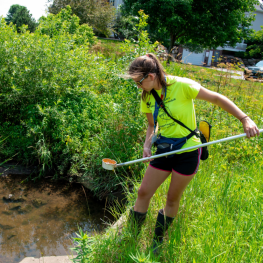Mosquitoes

In summer, we watch certain mosquito breeding areas for mosquitoes that carry diseases that can make you sick.
Why Are We Concerned About Mosquitoes?
- Mosquitoes can spread diseases like West Nile Virus.
- The main mosquito species we track is the Culex mosquito. This species can cause West Nile Virus infection in humans.
What We Do To Reduce Numbers of Mosquitoes that Cause Disease
- In addition to watching breeding areas, we trap adult mosquitoes to measure how many are in an area. Some of the mosquitoes are tested for West Nile Virus.
- If we find high numbers of the species that can spread West Nile Virus, we treat water on public lands to reduce the number of mosquitoes.
- We do this work in partnership with:
- City of Madison
- City of Middleton
- City of Monona
- City of Sun Prairie
- Town of Madison
- Village of Maple Bluff
- Village of Shorewood Hills
- The University of Wisconsin
You can Prevent Mosquito Bites and Disease
Prevent Mosquito Bites
- Wear long-sleeved shirts and long pants from dusk through dawn. That's when many mosquitoes are most active.
- Install or fix screens on windows and doors to keep mosquitoes outside.
- Use EPA-registered insect repellents and follow instructions carefully.
- Apply permethrin to your clothes and gear or buy items treated with permethrin.
Get Rid of Areas Where Mosquitoes Breed
- Mosquitoes lay eggs in or near water. Once a week, dump or clear water out of things like:
- Flower pots
- Gutters
- Buckets
- Pool covers
- Pet water dishes
- Birdbaths
- Rain barrels
- Trash cans
Where are West Nile mosquitoes found in Dane County?
The map below shows our summer 2023 larvae monitoring results. Culex mosquitoes (red icons) are most likely to carry West Nile virus. Aedes mosquitoes (yellow icons) can carry West Nile virus, but more rarely.


